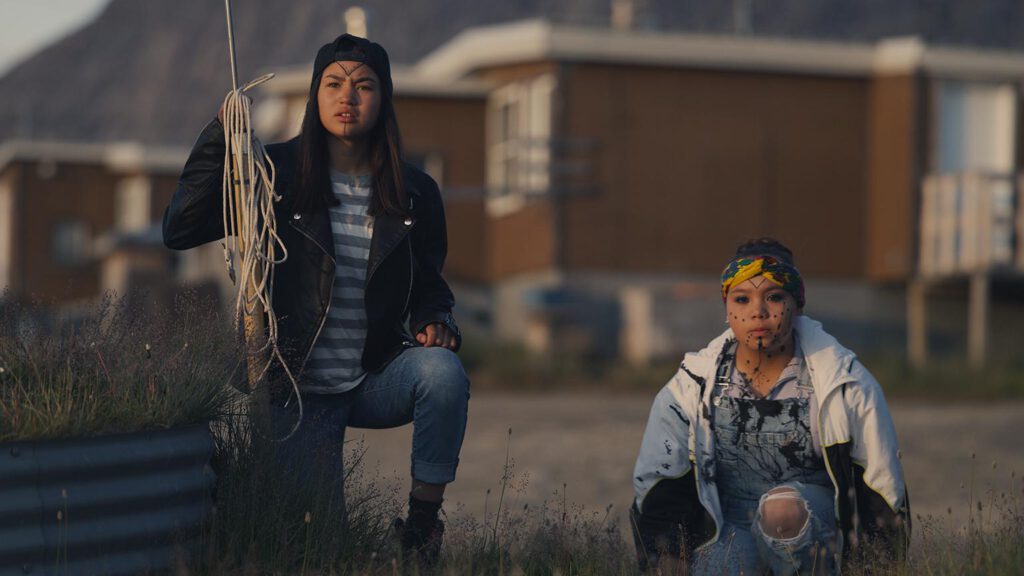This South By Southwest Film Festival included three films from three singular women with personal connections to the stories they felt should be told. In her film “Slash/Back,” Nyla Innuksuk uses genre to explore internalized shame within Inuit girls. In “Soft & Quiet,” Beth de Araújo the many dangers hidden in racist rhetoric. Lastly, “Nika” from director Vasilisa Kuzmina and co-writer Yulia Gulyan is a gorgeously shot tribute to a troubled poet whose life was cut short by the lingering trauma of childhood exploitation.
Set in the small arctic hamlet of Pangnirtung, Nunavut on the longest day of the year when the sun doesn’t set for 24 hours, writer/director Nyla Innuksuk mines her personal experience to craft a coming-of-age with an alien invasion twist. Co-written with Ryan Cavan, “Slash/Back” follows a group of rebellious teenage girls coming to terms with their own indigenous identities while fighting off mysterious shape-shifting creatures while their parents celebrate the solstice.
At the center of the group is Maika (a sassy Tasiana Shirley), whose internalized shame about her Indigeneity manifests in only replying in English to her parents who speak Inuktitut and turning her nose up at her family’s history as hunters. More interested in getting minutes on her cellphone and an invitation to the cutest boy in school’s party, she neglects her little sister Aju (Frankie Vincent-Wolfe) and gets into a fight with her best friend Uki (the tough-as-nails Nalajoss Ellsworth). When the girls discover the impending alien invasion, Maika learns her community’s traditional survival skills might be the only thing that can save her home.
Shot on location with local crews, cinematographer Guy Godfree captures the brutal Arctic snow with stark contrasts highlighting how truly isolated Pangnirtung is. By combining elements of John Carpenter’s “The Thing” with stories of the Ijiraq, shapeshifting creatures that supposedly kidnap children, Innuksuk reminds us that many popular horror stories also have indigenous roots. While the lo-fi CGI creatures reveal the film’s low budget, it more than makes up for it with some truly gnarly fight sequences in the back half. The girls from Pang seriously kick ass, and I can’t wait to see what Innuksuk does next.

The similarly low budget drama “Soft & Quiet” from writer/director Beth de Araújo tackles its budgetary constraints by keeping locations minimal and a tight ensemble cast. Shot over four days from start to finish to keep the real-time feel, the film follows an evening in the life of Emily (an unnerving Stefanie Estes), a kindergarten teacher who is kicking off the first meeting of a white supremacist group called Daughters of Aryan Unity.
The women of the group run the gamut of white supremacist rhetoric. Emily is obsessed with getting the respect she feels she deserves as a pure white woman. Mother and store owner Kim (Dana Millican) has no problem dropping the n-word into casual conversation. Recently released from prison, Leslie (a chilling Olivia Luccardi) just wants the stability of a group telling her what to do. Slowly the pleasantries of a typical women’s group devolves into acid-tongued discussions of the superiority of ethnic states over multiculturalism, jobs being stolen by immigrants, the question of being feminine over feminist, and more. When the action moves to Kim’s store, an altercation with two mixed-race Asian sisters Lily (Cissy Ly) and Ann (Melissa Paulo), the whole night takes a very dark turn.
Working in lockstep with her cinematographer Greta Zozula and editor Lindsay Armstrong, Araújo crafts a tense film that slowly reveals how simple racist rhetoric can escalate into physical violence on the turn of a dime. Following the story in real time is impressive, although by the end of the night most of the action was set in pitch blackness making it hard to figure out exactly what was happening. If Araújo and her team set out to make the audience more and more uncomfortable as the film progresses she more than succeeds. The filmmaking here is already so accomplished, there’s no telling what these filmmakers can do given a larger budget.

Possibly the best film I saw all festival, the character study “Nika” from director Vasilisa Kuzmina and co-writer Yulia Gulyan dramatizes the true story of the Russian prodigy Nika Turbina. Nika rose to fame as a child poet in the 1980s, only to be abandoned by the public after she quit writing at the age of 14. Set in 1999 and shot in gorgeous Kodak 35mm by cinematographer Mikhail Milashin, the film follows Nika as she tries to find her voice as an adult, despite a co-dependent relationship with her mother and a dependency on pills and alcohol.
Elizaveta Yankovskaya gives a star-making turn as the troubled erstwhile poet, her languid limbs moving through life with the grace of a dancer, her ferocious eyes reminiscent of a trapped animal. Kuzmina puts the audience directly in her point of view, often implementing tracking shots to follow her as she makes her way through the city. An early poem “The Nature of Memory” is repeated throughout, as Nika is haunted by memories of her own childhood. Manifested through flashbacks we see how Nika was groomed by her mother (Anna Mikhalkova) for celebrity and not much else.
The widescreen aspect ratio not only places Nika at the center of the story, but also serves to highlight how small and adrift she is in her surroundings. The rich Kodak color gives a nostalgic tint to the red neon signs, graffiti, and pink-blue ocean of the setting. Love and compassion for their subject courses through the film, even as Nika spirals, heading towards her unfortunate fate. Kuzmina and Gulyan have crafted a film as delicate as it is explosive, allowing Nika the woman a space in a narrative mostly dominated by her exploited childhood.












